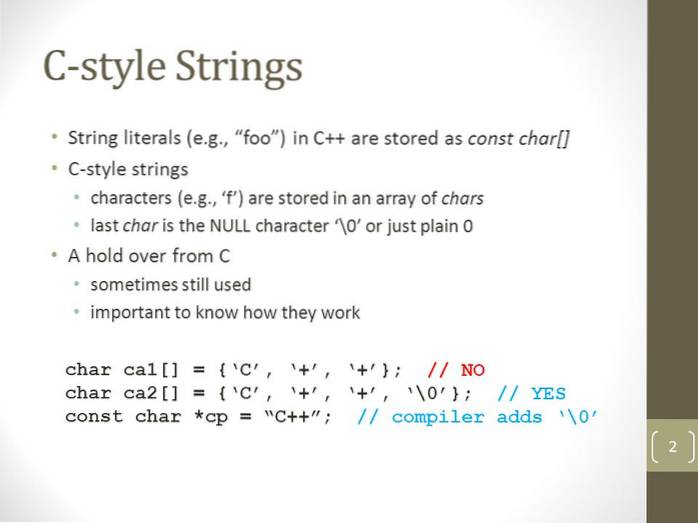- What is the string literal in C?
- How do you use string literals?
- What is an example of a string literal?
- What is literal string?
- What string means?
- What is the difference between string and string literal?
- Why are string literals read only?
- What is the difference between the two kinds of string literals?
- What is the difference between creating string as new () and literal?
- Which is a valid string literal?
- How do you treat a string?
- What does string literal mean in SQL?
What is the string literal in C?
A String Literal, also known as a string constant or constant string, is a string of characters enclosed in double quotes, such as "To err is human - To really foul things up requires a computer." String literals are stored in C as an array of chars, terminted by a null byte.
How do you use string literals?
A "string literal" is a sequence of characters from the source character set enclosed in double quotation marks (" "). String literals are used to represent a sequence of characters which, taken together, form a null-terminated string. You must always prefix wide-string literals with the letter L.
What is an example of a string literal?
A string literal is a sequence of zero or more characters enclosed within single quotation marks. The following are examples of string literals: 'Hello, world!' 'He said, "Take it or leave it."'
What is literal string?
1. Alternatively referred to as literal(s), a literal string is a series of characters enclosed in double or single quotes, depending on the programming language or command line. A program does not interpret characters in a literal string until it encounters the next double or single quote.
What string means?
A string is a data type used in programming, such as an integer and floating point unit, but is used to represent text rather than numbers. It is comprised of a set of characters that can also contain spaces and numbers. For example, the word "hamburger" and the phrase "I ate 3 hamburgers" are both strings.
What is the difference between string and string literal?
A String object is an individual instance of the java. lang. String class. ... This means, that the character sequence "abcde" will be stored at a central place, and whenever the same literal "abcde" is used again, the JVM will not create a new String object but use the reference of the cached String.
Why are string literals read only?
So some memory segments, notably the code segment (a.k.a. . text segment) became read-only (except by the operating system which loaded them from disk). It was natural for the compiler and the linker to put the literal strings in that code segment, and literal strings became read only.
What is the difference between the two kinds of string literals?
Two kinds of string literal
TADS has two different types of string literal, which are named according to the kind of quote mark that encloses them in the program source code: single-quoted strings and double-quoted strings.
What is the difference between creating string as new () and literal?
When we create a String object using the new() operator, it always creates a new object in heap memory. ... At a high level, both are the String objects, but the main difference comes from the point that new() operator always creates a new String object. Also, when we create a String using literal – it is interned.
Which is a valid string literal?
String literals are character strings surrounded by quotation marks. String literals can include any valid character, including white-space characters and character escape sequences. Once stored as a string literal, modification of the string leads to undefined results.
How do you treat a string?
Simple Programming
- print("Welcome To C#Corner..........")
- print("Treating String Like A List :")
- names=["C#Corner","MVP","Author","Member Of Month"]
- print("%s" % names[0])
- print("%s" % names[0][0],"%s" % names[1][0])
- print("%s" % names[2],"%s" % names[3])
What does string literal mean in SQL?
A string is a sequence of bytes or characters, enclosed within either single quote ( ' ) or double quote ( " ) characters. Examples: 'a string' "another string" Quoted strings placed next to each other are concatenated to a single string. The following lines are equivalent: 'a string' 'a' ' ' 'string'
 Linuxteaching
Linuxteaching



